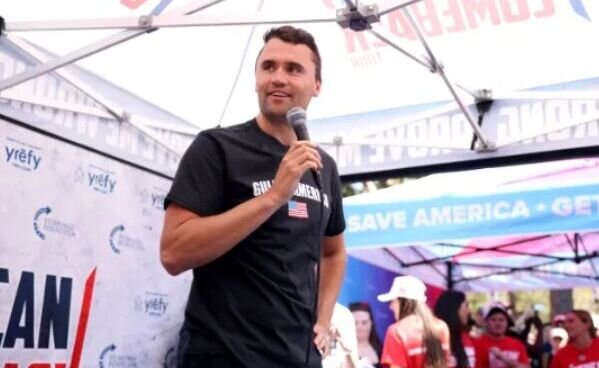As I sit here at my computer, my mind is racing. I am struggling with the assassination of Charlie Kirk. As my mind spins in so many different directions, it comes back to one thing.
Over the course of my nearly 53 years, I have been given a lot of advice, a lot of words and phrases intended to assuage hurt feelings and difficult circumstances. Some have proven to be true and helpful, others not so much.
One of the first lessons we learn as children is that people will say mean things about us. When that happens, we are told that “Sticks and stones may break my bones but words will never hurt me.”
There is no greater lie that we are told as children (and adults, for that matter) as that one sentence. Words hurt. Badly. Often, our words are our most formidable and deadliest weapons. Words build and uplift. They also tear down and destroy. They reinforce and encourage. They also threaten and scare.
The greatest question I have in the aftermath of Charlie Kirk’s death is the same one that most, if not all, of you have: “Why?”
Though a short question, it is a complicated one. I have lots of answers. Some are political. Some are spiritual. I think, though, that most correct answer is effectiveness.
Charlie Kirk’s words were effective. He spoke with authority, conviction, and purpose. Charlie was an unapologetic Christian – conservative, evangelical, unwavering, and uncompromising. His faith compelled him to do two things: Spread the Gospel of Jesus Christ and refuse to stand for the radicalization of the United States. Charlie and his Turning Point USA organization grew into the largest youth conservative movement and many credit it with mobilizing young voters to vote for Donald Trump in 2024, ultimately sending Trump back to the White House.
Consider for a moment those throughout history who have been silenced. Most were not warriors. They were politicians, scientists, orators, philosophers, teachers, activists. They fought their battles with words, logic, and authority. They challenged conventional wisdom and mobilized the citizenry behind them.
In their words was power – the power to challenge norms and usher in change. The only way to end their influence, their enemies thought, was to silence them permanently.
I did not wholesale agree with Charlie Kirk politically. While we certainly would have had far more similarities than differences, we would have had some disagreements. I am most definitely a conservative but I stop short at being a MAGA conservative. I believe I am much more objective about President Donald Trump’s leadership than that MAGA arm of the Republican Party.
Spiritually, however, I would almost 100 percent agree with him. His faith formed the foundation of everything he did, from his debates with students to his political advocacy. He found a way to blend his Christian faith with his political beliefs. And he did so with an authority and conviction that shook the bedrock of contemporary liberalism.
Charlie Kirk refused to stand for the normalization of the transgender movement, the rejection of moral absolutes, the indoctrination of the LGBTQ community, the belief that feelings dictate identity. Rather, he believed that we are all created in the image of God and God did not make a mistake in that process. He created us to live a certain way, act a certain way, treat each other a certain way, and do His will a certain way. If anyone should deviate from that plan, it was their mistake, not God’s.
His was not a message that was popular with the left. He was quick to point out that he believed they were wrong; however, he did so out of a genuine concern for their spiritual wellbeing and eternal security. To Charlie, the answers to the questions we have and the [often self-imposed] dilemmas we face are spiritual.
The left misconstrued his passion and fervor with hatred and judgment. Nothing could have been further from the truth. He was blunt. He was unapologetic. He was relentless and he was uncompromising. But he was neither hateful nor malicious.
His words had power and credibility – that was so because they came from a place of real compassion and divine concern. People picked up on that and it resonated with them. Charlie was able to articulate what so many others – myself included – wanted to say but could not. His words changed lives, altered eternal destinies, and exposed the modern progressive movement for the bleak and hopeless campaign it is.
His opponents could neither reason with him nor convince him to compromise with them. So they silenced him.
Or they think they did.
As history has proven, the attempt to silence a leader only magnifies his or her voice. Charlie Kirk is no longer with us but his message and his advocacy will indeed live on and increase in influence.
Just as Charlie’s life exposed the fallacy of liberalism, his death will expose its darkness. The left is clouded in a veil of gloom and negativity. With little to look forward to beyond this existence, liberalism focuses on what is happening right here and right now with a venomous sense of urgency. However, people of faith, people like Charlie Kirk, look at the human condition in an eternal perspective, which provides hope when things are toughest.
Right now, we are enveloped in despair. In spite of that despair, however, there is hope. Charlie Kirk spoke of that hope; now he has realized it. Those of us who share his worldview look forward to it and it directs our pathways as we continue our journey and the work before us.
The very qualities that gave Charlie Kirk his platform ultimately cost him his life. His adversaries, however, have not silenced his voice; they have amplified it. They have not ended his movement; they have intensified it.
Charlie Kirk was an effective agent of change in life. And he will be more so in death.







